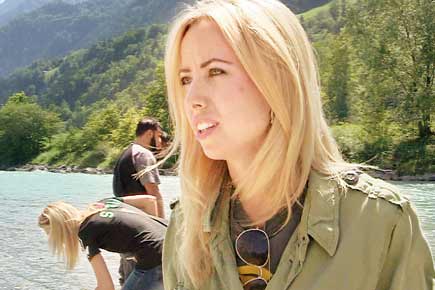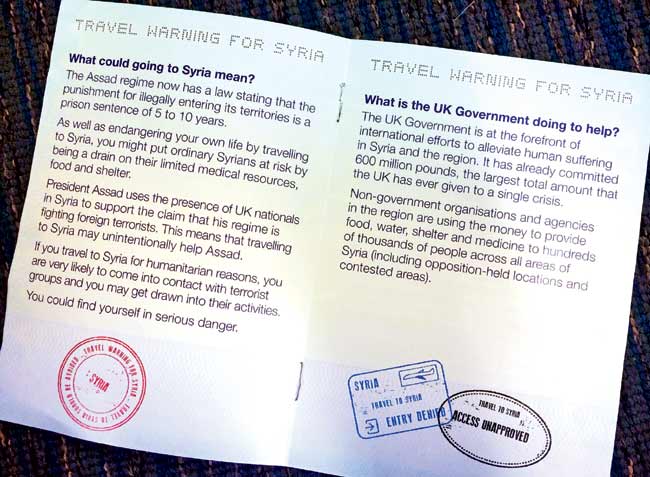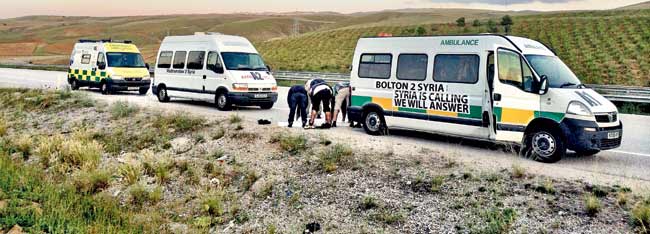Despite the UK government threatening to seize the passport of anyone travelling to Syria, many Britons are travelling to the war-ravaged country for humanitarian purposes. Hemal Ashar speaks to BBC’s Catrin Nye, who has made a documentary titled Our World — Destination Syria where she interviews and asks some of these unsung heroes, why they risked their lives to deliver aid and money to rebels who want to oust President Bashar Assad

BBC Worldu00c3u00a2u00c2u0080u00c2u0099s Destination Syria
As Syria simmers with a civil war going into its third year, and rivers of blood continue to flow through the land, increasing numbers of Britons are travelling to Syria. The Syrian Civil War is between two warring sides.
ADVERTISEMENT

PRESENTER: Catrin Nye of BBC World’s Destination Syria
On one side are rebels who want to oust President Bashar Assad and bring the regime down. They are up against fighters loyal to Assad (the Govt) and his regime. By July 2012, there were 16,000 people killed and today, the toll is much more.
The British government has told its citizens not to go to Syria, but many British fighters remain defiant. The UK authorities argue that Britons may be radicalised by what they see if they go to Syria. The UK government has threatened to seize the passport of anyone ignoring these warnings.

UK WARNS: The United Kingdom warns citizens not to go to Syria
Last month, BBC’s Catrin Nye travelled overland to the Syrian border with a convoy comprising a group from Bolton in the North of England, for a documentary called Our World — Destination Syria. She waited for them on the border as they entered Syria, to deliver aid, money and ambulances to the rebels against Assad, risking their lives and their passports. Excerpts from a conversation with Nye:

CONVOY AHOY: The convoy travels by road to Syria. Note the writing on the vehicle: Syria is calling, we will answer
Q. When did you go to the Syrian border?
A. We left the United Kingdom (UK) on June 6 and the journey to the border of Syria took one week.
Q. Where exactly did you travel to and how did you reach the border?
A. We drove through nine countries — England, France, Germany, Belgium, Luxembourg, Switzerland, Italy, Greece, Turkey and finally to Syria. It took seven days — the journey is more than 3,000 miles.
Q. How many persons were in the group that was going to Syria?
A. Apart from me and my director Suemay Oram, there were nine convoy members, all British Muslims. There was one woman and eight men. They came from all over the UK. It was great having an all-female team.
Q. How did the group enter Syria?
A. They crossed the border into Syria from Turkey at the Bab Al Hawa border crossing.
Q. What did they say to the British authorities?
A. They liaised with police at Dover in advance giving them the names of everyone on the convoy. At Dover the police remind everyone that their advice is not to go. They hand out a leaflet detailing the dangers and pointing out that even those going on aid missions could come into contact with terrorists.
Q. How are the police allowing people to go to Syria from the UK?
A. The police, UK government and charity commission’s advice is not to go but the authorities cannot actually stop the group. The group knew that they potentially face problems on coming back — questioning, potential arrest and in the worst case, the government has threatened to remove the passports of those travelling to Syria.
Q. What is the aim of this mission?
A. To deliver aid to refugee camps, and ambulances and money to hospitals in Syria. Kasim Jameel (33), leader of the group, has been there a number of times and so he knows locals in the area that he travels to, which is called Ad Dana.
Q. Where did they get the money for aid and the ambulance?
A. There was no charity attached to this convoy, so everyone had to individually raise the money to fund their donations and buy ambulances. The ambulances were packed with baby milk, baby food, and nappies mainly.
Q. Who are they helping? The rebels against Bashar Assad or Bashar Assad’s fighters?
A. The group are British Sunni Muslims who oppose Assad. They deliver their aid and ambulances in areas largely controlled by the Islamic Front (a merger of numerous Sunni rebel groups). The Islamic State in Iraq and the Levant (Isis) controlled the area until January, but were pushed out. The convoy does not support Isis.
Q. Why are they against Assad?
A. The convoy members argue that Assad is persecuting the people of Syria and that he has crushed a legitimate uprising against the government. According to Jameel, the Sunni rebels in Syria ‘are fighting against a barbaric regime’.
Q. Living in the UK, why are they so affected by the Syria problem?
A. The convoy are all British Muslims and so argue that the Muslims suffering in Syria are their brothers and sisters. They say that everyone should care about what is going on there, and, it is a tragedy that some appear to have forgotten.
Q. The UK fears that groups like this will be radicalised in Syria.
A. Kent police who the convoy speak to at Dover, hand over a document that reads ‘even if you travel to Syria for humanitarian reasons, you are very likely to come into contact with terrorist groups and may get drawn into their activities.’ The convoy argues that they will not be radicalised by what they see. One convoy member, Naaz Iqbal, 29, from Rochdale near Manchester says, “We are going to refugee camps, we’re helping people, we’re feeding people, if it has any impact on me it makes me a lot more humble. It does not radicalise me, it never will.”
Q. If the UK authorities are wary of them going, why do they go?
A. They argue that they are going to help, that the UK government and aid agencies are not doing enough to help. They are all British citizens and argue that they are loyal to the UK and would not do anything that would have a negative impact on their home.
Q. How did these men get convinced to go to Syria? Through the Internet or in other ways?
A. They had all read a great deal about the situation in Syria on the Internet and been to fundraisers in the UK. They all knew someone who had been on a previous convoy and heard about this one, so requested to join. Catrin’s full documentary Destination Syria is directed by Suemay Oram. It airs on BBC World News tonight at 11 pm
 Subscribe today by clicking the link and stay updated with the latest news!" Click here!
Subscribe today by clicking the link and stay updated with the latest news!" Click here!






